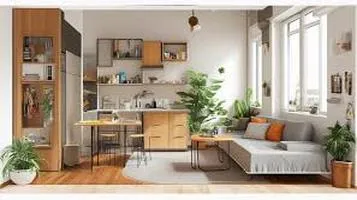Multifunctional and Modular Furniture: Revolutionizing Modern Living Spaces
Multifunctional and modular furniture is an innovative solution for modern living spaces, offering flexibility, efficiency, and style. Designed to adapt to various needs and environments, these pieces can transform small areas into functional spaces, making them ideal for urban homes, studios, and offices. Modular furniture allows users to customize configurations according to their preferences, enabling easy reassembly and repositioning. Multifunctional designs, such as sofa beds, extendable tables, and storage-integrated seating, maximize utility without compromising aesthetics. These furniture pieces often incorporate smart features, sustainable materials, and contemporary designs, aligning with eco-conscious and minimalist lifestyles. By optimizing space and enhancing versatility, multifunctional and modular furniture caters to the dynamic demands of modern living, offering both practicality and elegance.

In the ever-evolving landscape of interior design, multifunctional and modular furniture emerges as a game-changer, perfectly attuned to the needs of contemporary living spaces. As urbanization accelerates and living spaces become more compact, this innovative furniture category offers a blend of flexibility, functionality, and style that is hard to ignore. With its ability to adapt to various requirements and enhance the usability of any room, multifunctional and modular furniture is not just a trend but a testament to the ingenuity of modern design.
Adaptability and Space-Saving Design
One of the most compelling features of multifunctional and modular furniture is its adaptability. In smaller apartments and homes, where every square foot counts, these pieces can transform spaces with ease. For example, a sofa that converts into a bed, or a coffee table that doubles as a storage unit, maximizes usability without compromising on aesthetics. This adaptability is particularly valuable in urban environments, where space is often at a premium.
Consider a modular sofa system that can be reconfigured to suit different seating arrangements. Whether you're hosting a party or enjoying a quiet evening alone, the ability to modify your furniture to meet the occasion is a significant advantage. This flexibility extends beyond seating; modular shelving units, for instance, can be expanded or contracted based on your storage needs, making them ideal for growing families or individuals who frequently relocate.
Aesthetic Versatility
Multifunctional and modular furniture is not only practical but also stylish. Modern designs seamlessly blend with various interior decor themes, from minimalist and contemporary to rustic and traditional. The clean lines and often neutral color palettes of these pieces ensure they complement rather than clash with existing decor. Additionally, many manufacturers offer customizable options, allowing consumers to choose materials, colors, and finishes that perfectly match their personal style.
The aesthetic versatility of modular furniture also means that it can evolve with your tastes. As trends change or as you move to different living spaces, you can reconfigure or add modules to keep your furniture up-to-date. This longevity not only makes modular furniture a smart investment but also an eco-friendly choice, as it reduces the need for frequent replacements.
Enhanced Functionality
The primary appeal of multifunctional furniture lies in its ability to serve multiple purposes. This enhanced functionality is particularly beneficial in spaces like studio apartments or home offices, where the boundary between different living areas is often blurred. A desk that transforms into a dining table or a bed that folds into a wall unit exemplifies how multifunctional furniture can create a more efficient and organized living environment.
Moreover, the integration of technology into multifaceted furniture pieces adds another layer of functionality. Some modern designs incorporate charging ports, built-in speakers, or even smart home integration, making them not just pieces of furniture but integral components of a connected lifestyle. This convergence of technology and design elevates the user experience, making daily tasks more convenient and enjoyable.
Economic and Environmental Benefits
Investing in multifunctional and modular furniture can also have significant economic and environmental benefits. While the initial cost may be higher than traditional furniture, the long-term savings are substantial. The durability and adaptability of these pieces mean they can serve multiple purposes over many years, reducing the need for additional purchases. This cost-effectiveness is particularly appealing to young professionals and families on a budget.
From an environmental perspective, the sustainability of modular furniture cannot be overstated. Many manufacturers prioritize eco-friendly materials and production processes, and the longevity of these pieces means less waste in the long run. Additionally, the ability to reconfigure and repurpose furniture reduces the demand for new resources, aligning with the growing consumer preference for sustainable living.
Challenges and Considerations
Despite its many advantages, multifunctional and modular furniture is not without its challenges. One potential downside is the complexity of assembly and reconfiguration. While some systems are designed for easy setup, others may require professional assistance, which can add to the overall cost. Additionally, the mechanical components of multifunctional furniture, such as hinges and folding mechanisms, may wear out over time, necessitating maintenance or replacement.
Another consideration is the potential for compromise in comfort. For instance, a sofa bed may not offer the same level of comfort as a dedicated sofa or bed. Therefore, it’s essential for consumers to evaluate their specific needs and priorities when choosing multifunctional furniture.
Conclusion
In conclusion, multifunctional and modular furniture represents a significant advancement in the realm of interior design. Its adaptability, aesthetic versatility, enhanced functionality, and economic and environmental benefits make it an ideal choice for modern living spaces. While there are challenges to consider, the overall advantages far outweigh the drawbacks. As our living environments continue to evolve, the demand for innovative, space-saving solutions will undoubtedly grow, cementing multifunctional and modular furniture as a cornerstone of contemporary design. Whether you're looking to maximize a small apartment or create a dynamic, adaptable home, these pieces offer a smart, stylish, and sustainable solution.






